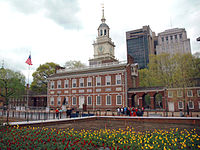
Back Kongres v Albany Czech Albany-Kongress German Congreso de Albany Spanish Congrès d'Albany French Kongres Albany ID Congresso di Albany Italian オールバニ会議 Japanese Kongres w Albany Polish Congresso de Albany Portuguese Олбанский конгресс Russian
Albany Congress | |
|---|---|
| Part of the French and Indian War | |
 The Albany Congress · 1754 by Allyn Cox | |
| Type | |
| Type | |
| History | |
| Founded | June 19, 1754 |
| Disbanded | July 11, 1754 |
| Succeeded by | Stamp Act Congress |
| Leadership | |
Governor | |
| Seats | 21 |
| Meeting place | |
| City Hall (Dutch: Stadt Huys) Albany, New York | |
| This article is part of a series on the |
| United States Continental Congress |
|---|
 |
| Predecessors |
| First Continental Congress |
| Second Continental Congress |
| Congress of the Confederation |
| Members |
| Related |
|
|
The Albany Congress (June 19 – July 11, 1754), also known as the Albany Convention of 1754, was a meeting of representatives sent by the legislatures of seven of the British colonies in British America: Connecticut, Maryland, Massachusetts, New Hampshire, New York, Pennsylvania, and Rhode Island. Those not in attendance included Newfoundland, Nova Scotia, New Jersey, Virginia, Georgia, North Carolina, and South Carolina. Representatives met daily at the City Hall (Dutch: Stadt Huys) in Albany, New York, from June 19 to July 11, 1754, to discuss better relations with the Native American tribes and common defensive measures against the French threat from Canada in the opening stage of the French and Indian War, the North American front of the Seven Years' War between Great Britain and France.
Delegates did not have the goal of creating an American nation; rather, they were colonists with the more limited mission of pursuing a treaty with the Mohawks and other major Iroquois tribes.[1] This was the first time that American colonists had met together, and it provided a model that came into use in setting up the Stamp Act Congress in 1765, as well as the First Continental Congress in 1774, which were preludes to the American Revolution.
- ^ H.W. Brands, The First American: The Life and Times of Benjamin Franklin (2002) excerpt and text search
© MMXXIII Rich X Search. We shall prevail. All rights reserved. Rich X Search